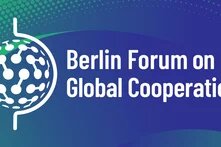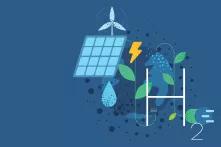Trump's return is a wake-up call. Germany and Europe must lead a new era of global cooperation - grounded in fairness, shared interests, and long-term partnerships with the Global South.

Donald Trump's return to the White House has shaken the world. With unprecedented recklessness, he is destroying the decades-long tapestry of international cooperation and international law. The ‘soft power’ of the United States is being sacrificed in favor of a claim to power, based on fear rather than respect. But fear cannot create lasting partnerships. Only mutual respect and shared interests can form the basis for stable global relations.
Europe, and Germany in particular, is thus facing a historically new challenge. In the East, an authoritarian ruler is attacking Europe, while in the West, a former ally is mutating into an unpredictable adversary. In view of this double crisis, Germany must take the initiative and put its relations with the Global South on a new footing.
A new partnership with the countries of the Global South requires Europe to overcome its ‘colonial superiority complex, which manifests itself in a kind of condescending charity and altruism’, as Carlos Lopes, former Secretary-General of the UN Economic Commission for Africa, put it. This is not about charity or moral superiority, but about clearly recognizing our deep interdependence: Europe's well-being is inextricably linked to that of the Global South. The climate crisis, the protection of biodiversity, the challenges of migration and humanitarian crises, and also the demographic challenges facing Europe and Africa can only be overcome together. Europe's future and security also depend on this question.
The partnership of equals must consist of three closely interlinked strands:
1. Economic cooperation for the transition to sustainability
At the same time, the protection of global natural public goods such as climate and biodiversity is an integral part of sustainable economic development. Labor migration can also play a key role in development by promoting knowledge transfer, economic dynamism and cultural exchange. Germany and Europe must create legal migration routes and enter into economic partnerships without weakening the economic development of the countries of origin.
Economic cooperation with the Global South must go far beyond traditional free trade agreements. It should aim at a just and sustainable transformation that benefits both the partner countries and Europe. This requires investment in modern, climate-friendly infrastructure and the creation of jobs in the partner countries by promoting local value creation. Access to raw materials that are essential for the energy transition and digitization must be based on fair and sustainable partnerships that prevent environmental destruction and exploitation. With the slogan ‘Clean Trade and Investment Partnerships’, Ursula von der Leyen has formulated a claim that now needs to be fulfilled.
2. Conflict prevention, humanitarian aid and an international law-based order
Peace and stability are prerequisites for sustainable development. Germany and Europe must intensify their efforts in conflict prevention, whether through diplomatic initiatives, support for regional peace processes or the establishment of resilient institutions in fragile states. Humanitarian aid remains a key component in alleviating acute crises. It must strengthen the rule of law and the ability of states to provide public services for the common good.
This includes credible support for an international order based on international law and multilateral institutions. Especially at a time when authoritarian actors are challenging international law, Europe must avoid double standards. This requires not only rhetorical commitments, but also concrete measures, such as strengthening the international courts in The Hague or ambitiously implementing national contributions to the Paris Climate Agreement.
3. Civil society, promotion of democracy and gender equality
A strong civil society is the backbone of democratic and resilient societies. Germany and Europe must expand programs that support independent civil society actors. Promoting democracy does not mean exporting Western models, but rather strengthening local actors who develop their own visions of good governance and social participation. Gender equality is a key lever in this regard: promoting women's rights and greater participation of women and LGBTIQ+ people in political and economic processes is not only a matter of justice and democracy, but also a key to sustainable development. At the same time, we must invest in state capacity that creates transparent and inclusive institutions. This includes building education and health systems that benefit all citizens, as well as fighting corruption and strengthening accountability in order to boost trust in state structures.
Germany has a diverse and effective institutional landscape, ranging from state development organizations to civil society actors. However, such resources must also be pooled at European level in order to become more effective in the new era of geopolitics. Europe's diversity of opinion is often a burden for its partners. What is needed now is a clear road map for the European integration of global cooperation at the intergovernmental level. Only in this way can Europe speak with one voice and use its resources effectively.
Financially, commitments to international obligations remain the immutable parameters for cooperation. Allocating 0.7 percent of gross domestic product to official development assistance (ODA), a fair share of global climate and biodiversity financing, including the implementation of the global climate financing target agreed in Baku, are minimum requirements for a rich country like Germany. It would be scandalous if the Federal Republic of Germany were to take on new debt on a large scale for infrastructure and defense while cutting international cooperation. Such cuts would not only undermine Germany's credibility, but ultimately our own security and prosperity, which depend on trust in global cooperation and stability.
Europe can and must do things differently. Germany now has the opportunity to take a leading role in and with Europe in shaping and defending principled global cooperation in which international law, sustainability and respect form the basis for trust-based cooperation for mutual benefit.
This article was first published on Africa.Table.


